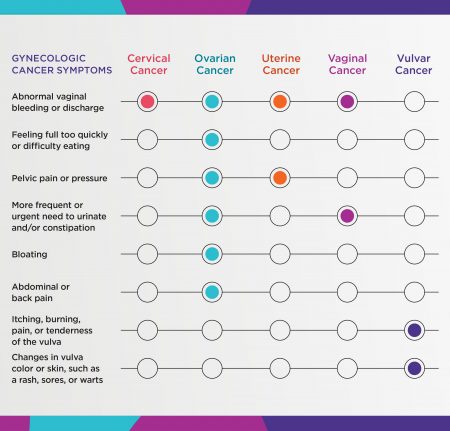January is Cervical Cancer Awareness Month
Quick Guideline
- Women: Get Pap tests every three years starting at 21-years-old
- Women: Get HPV tests after 30-years-old; check with doctor about frequency
- Children: Vaccinate against HPV starting at 12-years-old
Poster overview of Gynecologic Cancers, and their signs and symptoms
 January is
Cervical Cancer Awareness month. Represented by the color teal, the nation-wide initiative aims to increase
awareness about cervical cancer, HPV, and the importance of early detection.
Local chapters and events also raise funds for research into cause, prevention,
diagnosis, treatment, and to eventually find a cure.
January is
Cervical Cancer Awareness month. Represented by the color teal, the nation-wide initiative aims to increase
awareness about cervical cancer, HPV, and the importance of early detection.
Local chapters and events also raise funds for research into cause, prevention,
diagnosis, treatment, and to eventually find a cure.
Early-detection is key for prevention and treatment of cervical cancer. “Cervical cancer is one of the easiest gynecological cancers to prevent with regular screening tests,” Dr. Monique Small, CBHA obstetrician/gynecologist, said. “There are two screening tests proven effective to detect cervical cancer early.” The first is a Pap test. With this test, cells are collected and sent to a laboratory to look for any abnormalities. “We recommend young women begin screening with this test at the age of 21,” Dr. Small suggested. “Follow-up screenings then occur every three years, regardless of the age of onset in sexual activity.”
The second test screens for Human Papilloma Virus, or HPV. “The human papilloma virus (HPV) is the leading cause of cervical cancer,” Dr. Small said. “The Pap and HPV tests can be combined for early detection. If both of these tests are normal, no further testing is necessary again for another five years.”
Dr. Small says the HPV screening exam is recommended to start around the age of 30. She advises that women work with a gynecologist or primary care provider to find out the recommended frequency of screenings after age 30. “There are many guidelines out there, and it can be confusing for patients because they change frequently,” Dr. Small said. “We like to look at our patients’ medical history, and make a decision with them about how often they should be screened.” The important takeaway is that women remember to get the screening done!
Protect Our Children – Available Vaccines
HPV is one of the most common sexually transmitted diseases, and causes almost all incidents of cervical cancer. When a female is infected with HPV, and the virus does not go away on its own, abnormal cells develop in the lining of her cervix. If these cells are not caught early by a Pap test or HPV screening, and then subsequently treated, pre-cancer and cancerous cells can develop.
There are currently two vaccines available to help prevent certain types of cervical cancer: Gardasil and Cervarix. The FDA (Food Drug Administration) has approved Gardasil for use in females and males from ages nine to 26. The vaccine prevents four types of HPV that can lead to the development of cervical and other varieties of cancer.
Cervarix is also FDA-approved for prevention of cervical cancer caused by two different types of HPV. The CDC (Center for Disease Control) recommends that all kids, starting at 11- or 12-years-old, should get the three-dose series of the Cervarix vaccine to protect against HPV. For teen boys and girls who did not start or finish the HPV vaccine series when they were younger, they should get it now. Young women can get the HPV-vaccine series through the age of 26, and young men can get vaccinated through age 21.
The subject of disease prevention, and especially of sexually transmitted diseases, is a sensitive issue. “We advise our patients to talk to their medical providers about the vaccines, and decide which one will be the best fit for their child,” Dr. Small said. “These vaccines are proving effective against preventing cervical cancer in adulthood.”
Get involved in the Cervical Cancer Awareness campaign by wearing the teal ribbon, distributing handouts and flyers within your community, attending fundraiser event, sharing information about cervical cancer and HPV on social media, and visiting your medical provider for screening tests and vaccinations.
Call 509-488-5256 to schedule an appointment with a medical provider at your local CBHA clinic.